TCT 2024: Professor Wang Yan from Xiamen Cardiovascular Hospital Presents First Robotic-Assisted Transcatheter Mitral Repair System on the Global Stage
01 November,2024
The 36th Annual Transcatheter Cardiovascular Therapeutics Conference (TCT 2024) was held in Washington, D.C., USA from October 27-30, 2024. Professor Wang Yan from Xiamen Cardiovascular Hospital Xiamen University, delivered a presentation titled “First-in-Human Robotic-assisted Transcatheter Mitral Edge-to-Edge Repair for Treatment of Severe Mitral Regurgitation” at the TCT Innovation session. This marked the first time that a robotic-assisted transcatheter mitral valve repair technology, innovated in China, was showcased on a global stage at a leading cardiovascular conference, bringing international recognition to the clinical feasibility and safety of this original technology. This accomplishment provides a significant foundation for advancing the global recognition and application of Chinese-made medical devices.
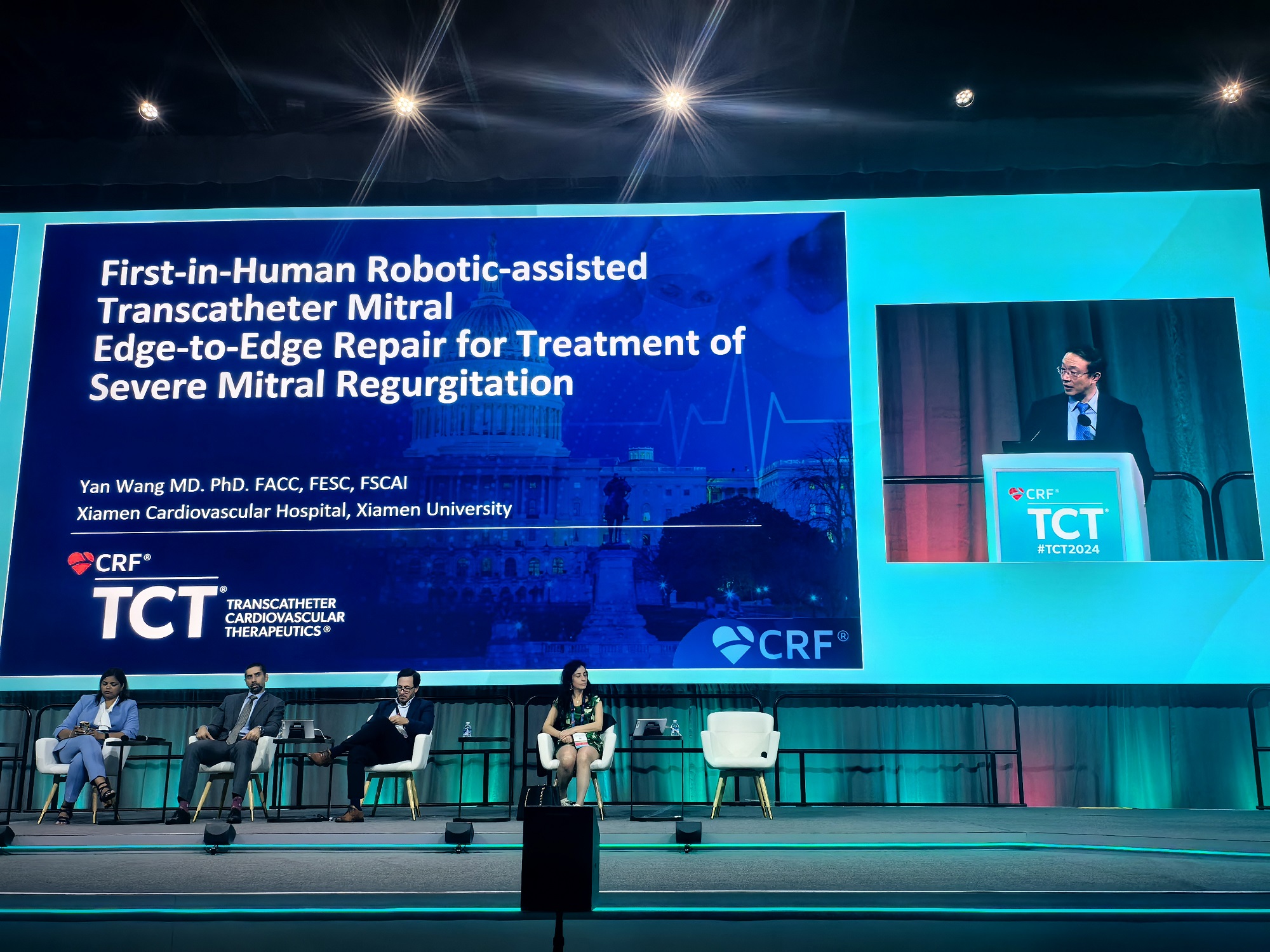
Prof. Wang highlighted that robotic-assisted transcatheter interventions represent the future of interventional treatment. Leveraging emerging technologies such as artificial intelligence, surgical robotics are poised to transform traditional cardiovascular interventions. Xiamen Cardiovascular Hospital has spearheaded the development and clinical research of a transcatheter valve intervention robotic system, a uniquely Chinese innovation that establishes a new model in cardiovascular intervention by integrating medical and engineering technologies. Prof. Wang’s presentation received enthusiastic acclaim from the international experts in attendance, with several expressing keen interest in adopting the technology at their institutions.
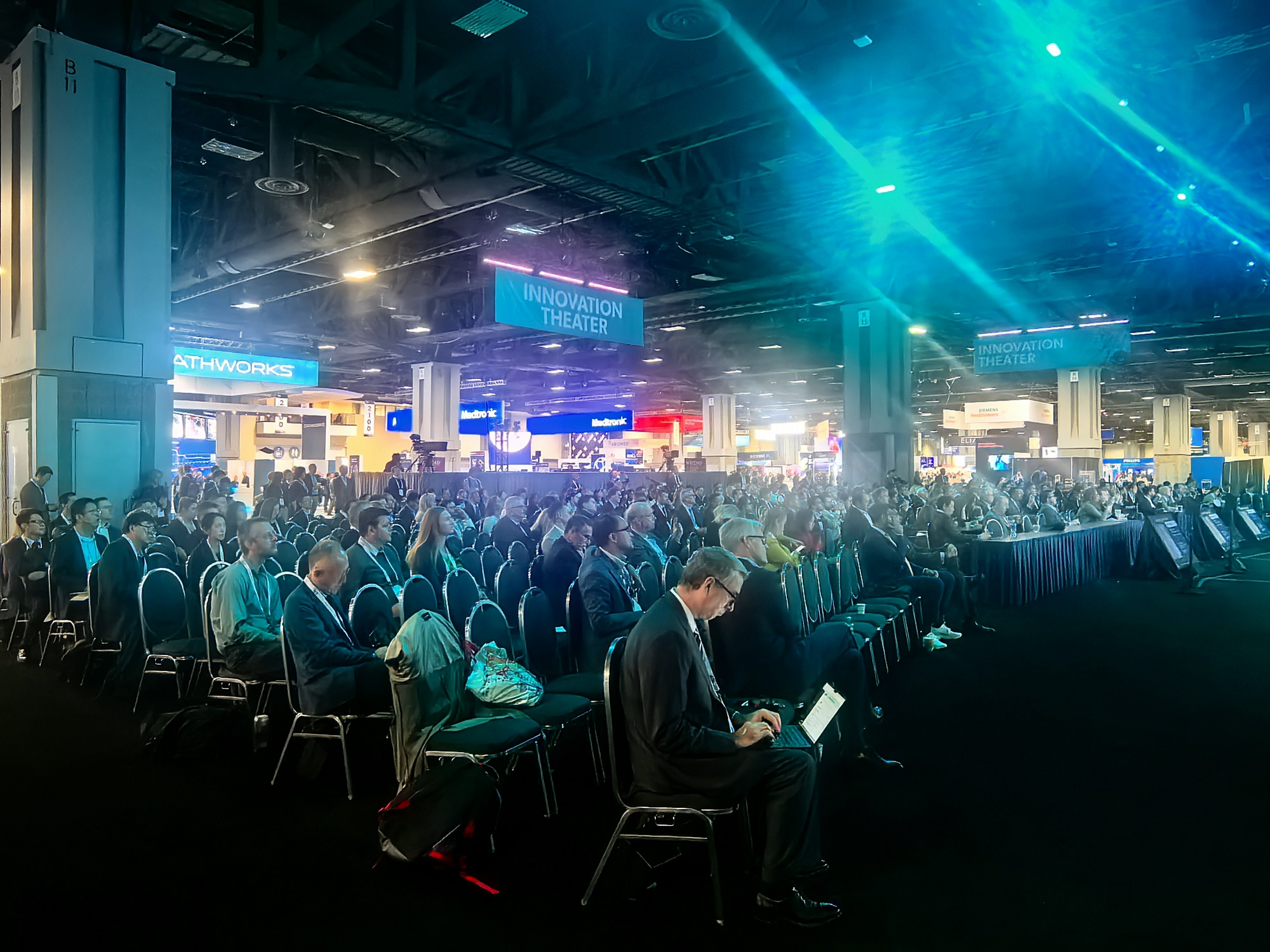
Currently, transcatheter edge-to-edge repair (TEER) is the most advanced and widely adopted technique for treating mitral regurgitation (MR). With the rapid advancement of new technologies, robotic-assisted surgeries, known for their precision and control, are finding applications across multiple fields, including cardiac procedures. Prof. Wang and his team collaborated with domestic medical device innovators over several years to develop this robotic platform. In December 2023, they performed the world’s first robotic-assisted TEER procedure, successfully repairing the mitral valve of a patient with severe functional MR. In May 2024, they completed another TEER procedure using the MitraClip G4 device with this robotic platform, further demonstrating the system’s versatility and future scalability. To date, Xiamen Cardiovascular Hospital has completed five cases of robotic-assisted TEER, establishing itself as a global leader in robotic interventions for structural heart disease.
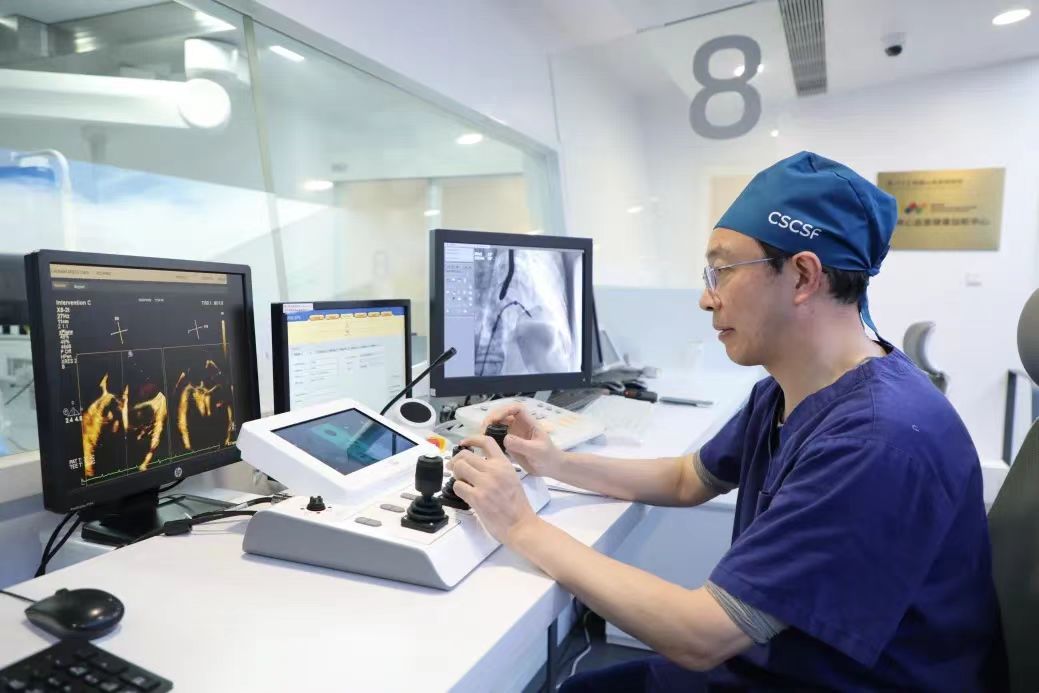
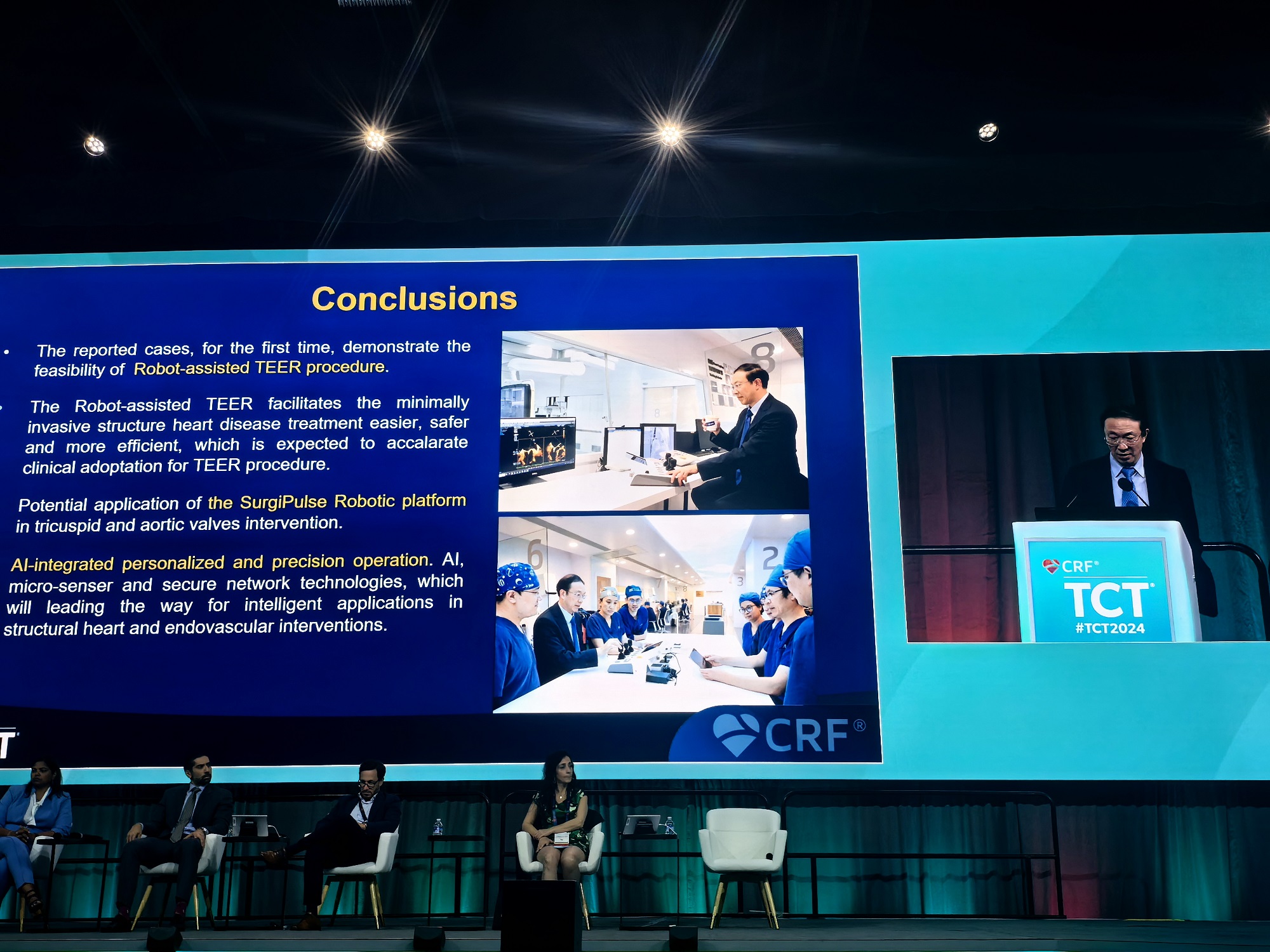
During his presentation, Prof. Wang introduced the functionality of the SurgiPulse Robotics’ Platform, the hospital’s independently developed robotic system, highlighting its procedures and the unique advantages gained through their TEER procedure experiences. Compared with traditional techniques, the platform offers three major advantages: precise and stable control that ensures efficient completion of critical surgical steps; a reduced learning curve that allows young physicians to quickly master the TEER procedure; and remote operation capabilities that minimize radiation exposure to the surgeon, improving their safety. Enhanced by 5G and other emerging technologies, the platform also supports remote surgery, helping extend medical care to more regions.
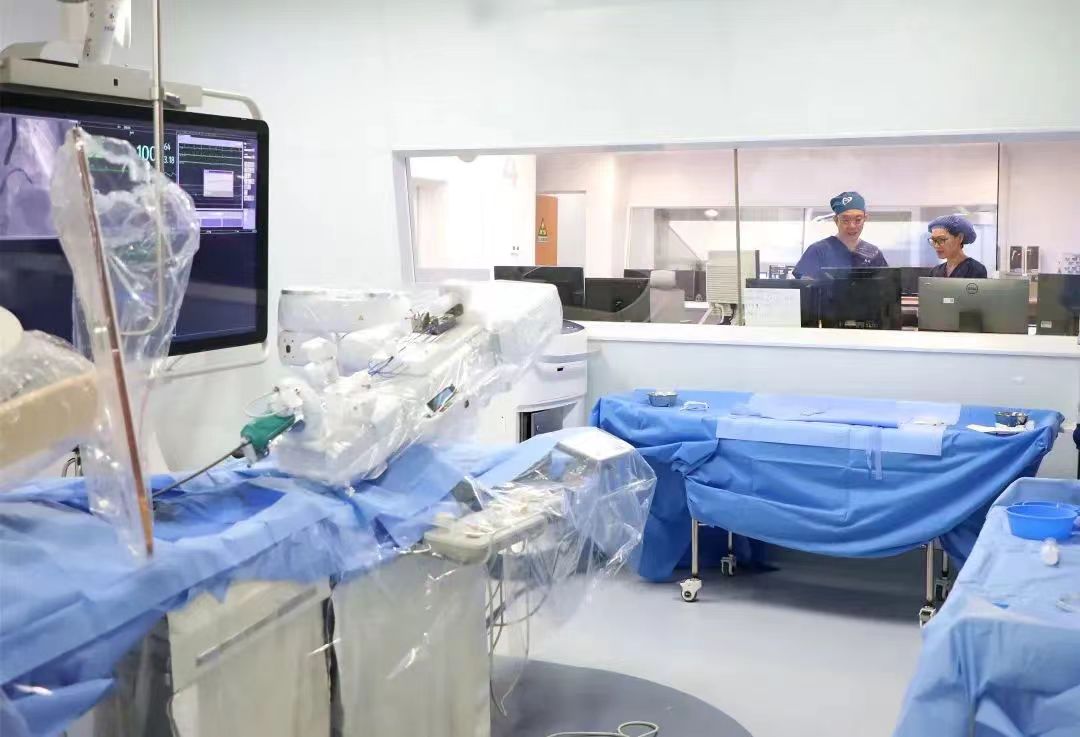
Prof. Wang shared clinical data from the five robotic-assisted TEER procedures conducted at Xiamen Cardiovascular Hospital, involving five severe MR patients (three female, two male) with an average age of 76.2 years, including cases of degenerative MR and functional MR. There were no mortalities, with a technical and procedural success rate of 100%. Significant improvements were observed in MR severity post-surgery: four patients reduced to ≤1+ and one to 2+. The 30-day follow-up indicated no adverse events including death, stroke, major bleeding, or device-related complications requiring surgery, and all patients exhibited improved cardiac function.
These preliminary data substantiate the feasibility and safety of robotic-assisted TEER for severe MR treatment, significantly broadening the application prospects for robotics in structural heart disease interventions. Looking ahead, Xiamen Cardiovascular Hospital will lead a multicenter, randomized clinical trial to further evaluate the efficacy and safety of this technology. With the integration of artificial intelligence, multi-sensor systems, and smart alarm, the precision and safety of robotic-assisted transcatheter intervention will continue to improve, accelerating the use of this technology in cardiovascular and other areas of medicine.
As the largest and most significant international conference in cardiovascular intervention, TCT 2024 brought together thousands of leading experts and scholars from around the world to share and discuss the latest research and clinical advances. Prof. Wang’s invitation to present China’s original robotic-assisted intervention technology highlights the country’s innovative contributions and forward-thinking exploration in the cardiovascular field, showcasing China's role in advancing clinical solutions for structural heart disease and offering new perspectives to global cardiovascular medicine.
share
Latest News
-
01 December,2025
Heart Saplings Blossom| Fellows from India and Indonesia Win Awards at International Academic Conferences with Cases from XMCH
-
03 November,2025
“Made-in-China” Robot Performs Cross-Continental Heart Intervention, Achieving a World First in Remote Operations
-
09 October,2025
Accelerating Technology Export | Xiamen experts conduct academic exchanges and demonstrate domestic IVL procedure in multiple hospitals in Pakistan

